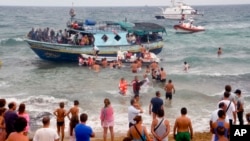The largest number of migrants flooding Europe this summer are refugees from a long and violent war in Syria. Among African migrants sailing the Mediterranean for the shores of Italy and Greece, the highest number come from the small East African country of Eritrea.
For years, governments in Europe have welcomed Eritreans with open arms and automatic asylum.
Since Eritrea achieved independence in 1991, President Isaias Afewerki’s unchallenged 24-year rule has not produced the achievements envisioned when Eritrea’s rebels in sandals won a long guerilla war and re-entered their capital, Asmara.
That also remains the view of the few outsiders who have managed to follow independent Eritrea’s recent history.
“There are a very large number of Eritreans fleeing across the Mediterranean, particularly relative to Eritrea’s size,” says Bronwyn Bruton, the deputy director of the Atlantic Council’s Africa Center in Washington, D.C.
Bruton he is an observer of Eritrea’s post-independence struggles. “Eritrea has a population of about six-and-a-half million people and last year it’s believed that there were at least 45,000 refugees that fled. That was a significant increase over previous years. The number of refugees appears to have tripled in the last year or so. Well, since the beginning of 2014.”
Is it poverty or repression?
The European Union is conflicted over the massive migrant flows from Syria and some African countries. The 28 member states of the E-U debate whether Eritreans – in particular - are coming because they are poor or because they are repressed.
Leonard Doyle of the International Office for Migration says it really doesn’t matter, because migration is a natural global phenomenon of people trying to better themselves. But he says Eritrea surely qualifies on economic grounds.
“Well, the economy is poor, It’s been relatively easy to get into Europe,” says Doyle. “As that is the case, you know it would be in the self-interest for a family or very young people to go off to Europe and make a fortune.
“Unfortunately it is not really the best way to do things because they can be robbed, they can be beaten up. They can lose their life along the way. And if they get there, they are unlikely - well even if they get political asylum - without skills they not necessarily going to be in a position to contribute.”
A children’s migration
One indicator of the unusual nature of Eritrea’s migration is the high number of children who escape from the country. Many believe Eritrea’s children are escaping their government’s national service, a kind of forced labor.
Doyle says, “Well, about 34,000 arrived by sea alone last year, including nearly 5,000 unaccompanied minors.”
Some say Eritrea’s has as many as 45,000 active duty military and 250,000 reservists that may constitute one of the largest armies in Africa - with probably the highest ratio of conscripted citizens.
The force is based on mandatory national service for all able-bodied men and women. It was inspired by a long and costly war with neighboring Ethiopia over a border debate that is still unsettled.
Critics say Eritrea’s soldiers have to serve for as many as 10 years maintaining national security, building roads and – some say - working for foreign mining companies.
Bruton says national service is a major factor in the migration patterns.
“The reasons that people are fleeing are, I think, a little unclear. On the one hand, Eritrea historically has a national conscription program which is a period of national service that in theory is supposed to last for 18 months but in practice has often been indefinite.” She says the conditions of the service have been very unpleasant, people are paid very small amounts of money, and “there have been allegations of brutality, torture, sexual abuse.
“There have been allegations that people who are critical of members of the government, for example, can be arrested and detained indefinitely without due process of law.”
Earning automatic asylum
Eritrea appears near the bottom of most country-by-country rankings on various indices: Number 181 for human development, 155th for democracy, 189th for ease of doing business; 174th for economic freedom. For the last eight years a survey by World Press Freedom ranks Eritrea last. In early June, the U-N Commission of Inquiry on Human Rights in Eritrea reported possible crimes against humanity in the arbitrary arrest of journalists.
Doyle simply counts the numbers of Eritreans leaving home ot seek political asylum in Europe.
“I think it’s changing but heretofore if anyone fled Eritrea without any military service, they were kind of on the wrong side of the law," Doyle says. "So there was a tendency to automatically give people from Eritrea refugee status. But that seems to be changing within Eritrean itself. It’s not so clear anymore. But nonetheless, one of the country’s big exports is its people. So they keep heading to Europe.”
During Bruton’s visit to Eritrea she was told by many government officials and by Mr. Isaias himself that Eritrea is opening its doors and is demobilizing some of its national service forces.
Part 1 of a series on the risks of the dangerous trail to Europe, why there are leaving home and whether policies in Europe and Eritrea are changing.














